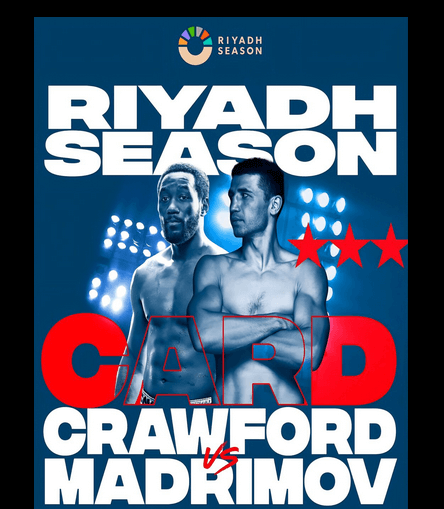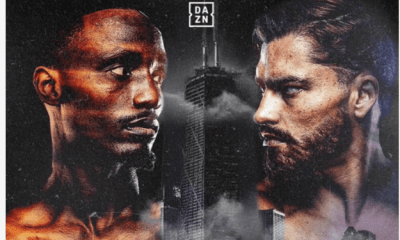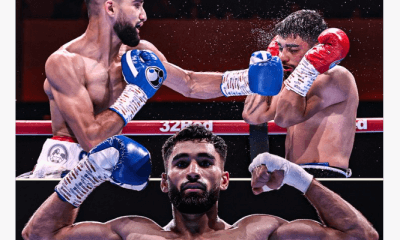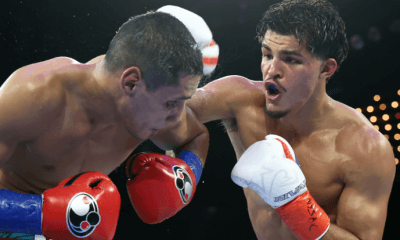Featured Articles
The Hauser Report: Riyadh Season Comes to America

The Hauser Report: Riyadh Season Comes to America
On August 3, at BMO Stadium in Los Angeles, Terence Crawford made a muted statement, eking out a close decision victory over Israil Madrimov in what was expected to be a legacy-building fight. Jared Anderson and Issac Cruz landed with a thud. And several other performances fell short of expectations. But a huge statement was made by The Kingdom of Saudi Arabia which propped up the card financially and is using boxing to expand its influence and cultivate an image throughout the world.
In recent years, the Saudi Arabian General Entertainment Authority (GEA) has invested heavily in sports. It has changed the economics of professional golf through creation of the LIV golf tour and hosted significant competitions in events ranging from Formula One automobile racing to mixed martial arts. The Women’s Tennis Association season-ending finals are scheduled to be contested annually in Riyadh through 2026. A “6 Kings” tennis showcase featuring Novak Djokovic, Carlos Alcaraz, and Rafael Nadal will be held in Riyadh later this year. And Saudi Arabia has been designated as the host country for the 2034 World Cup.
The Saudi government says that it’s investing in sports to build The Kingdom as a tourist destination. Critics call the program “sportswashing” designed to cover up a multitude of wrongs such as the denial of equal rights to women and the suppression of free speech.
The first “megafight” contested in Saudi Arabia was the December 7, 2019, rematch between Anthony Joshua and Andy Ruiz. Within the past ten months, The Kingdom has hosted five major boxing events, the most significant of which saw Oleksandr Usyk defeat Tyson Fury to claim the undisputed heavyweight championship of the world. Now the GEA boxing program (part of an entertainment extravaganza known as “Riyadh Season”) has extended its reach to America.
It has always been politically acceptable to do oil business with Saudi Arabia. McDonald’s has more than 250 outlets in the Kingdom. Apple controls forty percent of the Saudi mobile phone market.
Should sports be different?
Earlier this year, Bob Arum (who has a long record of supporting Jewish and progressive political causes) noted, “Everything has its compromises, in life and in business. I think we have to be pleased we’re seeing these big fights no matter where they take place.”
Others draw a parallel between Saudi Arabia’s sports branding and corporations paying large sums for stadium naming rights or buying advertising time during telecasts.
And Las Vegas showed decades ago that sports can lure tourists to a desert destination.
But unlike most sports sponsors, the Saudis have a political agenda as well as a commercial one.
And there’s another difference. Saudi Arabia receives 500 billion dollars in oil revenue each year. It can spend what it wants to get what it wants in boxing without worrying whether fight-related expenses are covered by income from fights. And the Saudi Arabian General Entertainment Authority is considering a plan that, if implemented, could lead to the domination of professional boxing.
Fighters now routinely thank His Excellency Turki Al-Alshikh (chairman of the GEA and architect of the Saudi boxing program) the way they once paid homage to HBO and Al Haymon. Matt Christie, taking note of Saudi Arabia’s recent domination of the heavyweight landscape, wrote at the start of this year, “Turki Al-Alshikh is doing for heavyweight boxing what ecstasy pills did for Manchester nightclubs in the 1990s. The banner division has become his playground and, all around him, hands are being held, minds are being lost, fights are breaking out, and the pupils of the old and tired are bulging with euphoria. Resistance to this extraordinary Saudi revolution is futile because, irrespective of any nagging voices suggesting something isn’t quite right, it’s happening. Don’t worry about the long-term consequences or what might go wrong because, right here and right now, we’re in the thick of the party of a lifetime. Al-Alshikh, in the space of six breakneck months, has become the most influential figure in the entire sport.”
That brings us to August 3 in Los Angeles. There were eight fights on the card but Crawford-Madrimov was the lynchpin. Terence is at or near the top of virtually every pound-for-pound list. Early in the evening, Turki Al-Alshikh went so far as to call out Canelo Alvarez, challenging him to fight Crawford in Riyadh or Las Vegas in February 2025.

Turki Al-Alshikh
There was a lot of hype throughout the evening. The GEA deserves credit for constructing solid undercards. But DAZN blow-by-blow commentator Todd Grisham sounded like a carnival barker when he called the affair “maybe the best card in all of boxing history” and “perhaps the biggest card that boxing has ever seen.”
That said; three fights on the undercard stood out. Jose Valenzuela outboxed heavily-favored Isaac Cruz to claim the WBA 140-pound title. Jarrell Miller and Andy Ruiz slogged to an entertaining twelve-round draw. And Jared Anderson (hailed as America’s best heavyweight prospect) was knocked down three times before being stopped in round five by Martin Bakole (who was born in Congo but fights out of Scotland).
The evening seemed to drag on forever. The main pay-per-view telecast began at 3:00 PM Pacific time. There were unnecessary delays between fights. A featured performance by Eminem didn’t start until 9:15 PM (at which point crotch-grabbing and liberal use of the word “motherf—–” were introduced to Riyadh Season). That was followed by the national anthems of Saudi Arabia, Uzbekistan (Madrimov’s homeland), and the United States. Crawford-Madrimov didn’t start until 9:55 PM which was well after midnight on the east coast.
Crawford came into the fight as a 6-to-1 favorite, riding an 11-fight-8-year knockout streak. Terrence usually takes three or four rounds to decode his opponent and then the destruction begins. But against Madrimov, he couldn’t solve the puzzle.
Israil was quicker than expected, strong with good footwork, and fought a disciplined fight. Terence responded cautiously. Both men tried to counterpunch without having many punches to counter. The crowd didn’t like it. After nine rounds, the contest appeared even. Then Crawford finished stronger to claim a 115-113, 115-113, 116-112 triumph. But Crawford-Canelo (which was a stretch to begin with because of the weight differential between the two men) now looks like a bridge too far.
In that regard, Turki Al-Alshikh might be finding out that matchmaking is more complicated than he thought. The Saudis invested a lot of money in Deontay Wilder, who promptly lost twice. Oleksandr Usyk is far less marketable than Tyson Fury. His Excellency announced on social media earlier this summer that Jared Anderson had followed his advice and brought on Sugar Hill Steward as his new trainer. Oops!
At present, three more fight cards are scheduled to take place under the Riyadh Season banner this year.
On September 21, the GEA will extend its reach to Wembley Stadium in London when Anthony Joshua and Daniel Dubois square off for the recently devalued IBF heavyweight belt. Usyk has beaten both Joshua (twice) and Dubois and became boxing’s first “undisputed” heavyweight champion in more than two decades when he decisioned Tyson Fury in Riyadh in May of this year. But after collecting a healthy sanctioning fee for Fury-Usyk, the IBF stripped Oleksandr for choosing to honor his rematch clause against Fury rather than fight a meaningless “mandatory” defense against Dubois (who became the IBF’s mandatory challenger a mere ten weeks ago). It’s unfortunate that Turki-Alalshikh (who was essential to the unification process) is supporting this fragmentation of the crown.
If things proceed as planned, Artur Beterviev and Dmitry Bivol will meet in Riyadh for a much-anticipated 175-pound title-unification bout on October 12. Then Usyk-Fury II will be contested in The Kingdom on December 21.
Meanwhile, Turki Al-Alshikh has been establishing relationships and building for the future. No one knows how far the Saudi bandwagon will roll. But it’s worth looking at what might happen in the future.
Let’s start with the proposition that, yes, the General Entertainment Authority is making some good fights. But consider what the public is being charged to watch them.
Nearly three years ago, Paul Magno wrote of boxing in the United States, “Almost everything is behind some sort of paywall. Despite the promise brought by an influx of mainstream money to the sport over the last few years, things are more walled off from access than ever. Everything requires some sort of subscription or a direct pay-per-view fee. That’s certainly no way to build a dwindling fan base. And it also does nothing to keep loyal fans who are growing increasingly tired of seeing the hat passed to them before every fight.”
DAZN is the General Entertainment Authority’s main distribution partner for boxing at the present time, although TNT Sports, Sky Sports Box Office, ESPN, and other outlets such as PPV.com are part of the process. Recently, Turki Al-Alshikh posted on social media, “I have become increasingly impressed with DAZN’s quality and with what they offer to us. I hope that one day DAZN will become the home for all combat sports, especially boxing and MMA.”
But DAZN has yet to build an effective marketing platform in the United States. And there are times when it seems as though the American market is little more than an afterthought for DAZN and its Saudi patrons. For example, Usyk-Fury II is scheduled to take place opposite three first-round playoff games in the college football championship tournament that will be shown on free television in the United States at noon, 4:00 PM. and 8:00 PM eastern time. That’s the equivalent of televising a fight on pay-per-view in the United Kingdom opposite a free knockout-stage World Cup contest between England and Argentina.
Also, DAZN is now at a point where, insofar as boxing is concerned, it’s giving subscribers quantity rather than quality. Too many of its fights are predictably mediocre. Many of its “free” shows are novelty boxing. In some instances, DAZN pays promoters as little as one dollar for the right to stream an entire fight card (and gets what it pays for).
A DAZN subscription is expensive to begin with. Boxing fans in the United States who add to that cost by buying the fights they most want to see on DAZN-PPV will be charged more than a thousand dollars this year. The Crawford-Madrimov card cost $79.99 in America and £24.99 in the United Kingdom. Most of the pay-per-view numbers in the United States for Riyadh Season fights have been dreadful.
So, a word of advice. Stop saying you’re “doing this for the fans” and actually do something for the fans. Don’t put the fights that matter most on pay-per-view where many fans can’t afford to see them. Put some of them on “free” television to reward loyal fans and build a fan base for the future. The Kingdom can afford it,
At present, the General Entertainment Authority is planning a lavishly-funded website (boxing.net) under the stewardship of Rick Reeno, who built Boxing Scene into a must-visit destination before it was sold by Paramount to new ownership.
Boxing needs a free website that keeps the industry and fans current on every aspect of the sweet science. The GEA can afford a website with a top-of-the-line infrastructure and elite editorial talent. The question is whether boxing.net will actually come to fruition and, if it does, whether it will be an independent voice, a propaganda outlet, or something in between.
Riyadh Season has entered into sponsorship agreements with various sanctioning bodies and promoters. That will add to its visibility, keep the sanctioning bodies in line, and further curry favor with promoters.
And there is talk of a project that would extend beyond anything the sweet science has seen before – the creation of a league that would redefine boxing as a business and a sport.
Turki Al-Alshikh alluded to the league in a sitdown with a small group of reporters in Riyadh earlier this year. Articles in the New York Times and on Reuters in June elaborated on it. Nothing is certain at present. But one scenario being contemplated is:
(1) Saudi Arabia’s sovereign wealth fund (the Public Investment Fund) would finance the project and pay out as much as two billion dollars to put the league in place. It would be a joint venture between boxing’s major promoters and one or more Saudi entities. Most likely, league fights would be promoted by Sela (a company owned by the Public Investment Fund that has taken the lead in developing the Saudi sports program).
(2) The business would promote high-profile fights around the globe under one brand name (as is the case with UFC). Roughly two hundred of the best men’s boxers in the world (women aren’t included in the present plan) would be divided into twelve weight classes (boxing currently has eighteen weight divisions). The best would fight the best with fighters moving up or down in the league rankings based on performance. Fighters could be dropped by the league and replaced by new talent as circumstances warrant.
The proposal could turn non-league fights orchestrated by today’s promoters into a minor league of sorts. In essence, the promoters would be developing new fighters to the point where the Saudi League is ready to sign them.
Jim Lampley (who was the voice of HBO Boxing for decades and now comments on fights for PPV.com) observes, “There are some similarities between what the Saudis are doing and the way HBO was at its peak. HBO gave fans a broadly based expectation that there was an organization committed to making the biggest best fights possible. And it became the gathering point for the highest-impact, highest-priced, most globally important fights in boxing. But HBO’s goals were different from the Saudis’. It was trying to sell subscriptions and pay-per-view buys, not change the world. And while HBO established itself in boxing by paying more than the competition, it never paid as much above the prevailing market rate as the Saudi government is paying now.”
Boxing needs a strong collective entity and central authority. But questions about the proposed league abound.
Who would run the league as its de facto commissioner? Would the world sanctioning bodies play a role?
What would happen to fighters who choose to not participate? What if the powers that be have a prejudice for or against a particular fighter because of the fighter’s religion? Or his marketability? Or his penchant for speaking out on social issues? Like Muhammad Ali once did. Except suppose, in this instance instead of refusing induction into the United States Army, the fighter repeatedly criticizes the Saudi government for its treatment of women or the lack of a free press? Suppose, unlike all the fighters who have journeyed to Riyadh at government expense to pay tribute to Turki Al-Alshikh and proclaim what a wonderful country Saudi Arabia is, a fighter has a divergent view? Does this mean that he will be denied access to bigtime boxing? Keep in mind; a Saudi-backed boxing league would be accountable in the end to the Saudi monarchy and Crown Prince Mohammed bin Salman.
What sort of testing for performance enhancing drugs would the league require? VADA testing has been in place for most Riyadh Season boxing matches. But because of timing constraints, the testing has been spotty.
The proposed league offers an ideal opportunity to advance clean sport. Its overseers could say, “We’ll have the most comprehensive PED testing in boxing. To join the league, a fighter will have to submit to VADA testing 365-days a year with VADA’s standard reporting requirements in place. No adverse test result will be covered up. And the beauty of it is that all two hundred of our fighters will be subject to the same rigorous testing, so they won’t have to worry about an opponent juicing while they’re clean.”
Will the Saudis put a serious PED enforcement mechanism in place or just pay lip service to the issue? Turki Al-Alshikh knows the answer to that. I don’t.
Saudi Arabia’s participation in boxing has been a mixed bag to date. There have been some good fights that most likely would not have happened without it; most notably Tyson Fury vs. Oleksandr Usyk. And Riyadh Season has made a small number of wealthy people wealthier. But that money has not trickled down to boxing’s middle and lower classes. And the truth is that boxing today, particularly in the United States, is not a healthy sport.
A healthy sport is self-sustaining in terms of revenue. The Riyadh Season fights are happening because the Saudi government has been willing to lose tens of millions of dollars promoting them. Meanwhile, traditional promoters are imploding, creating a power vacuum that the GEA has moved into.
Premier Boxing Champions is promoting fewer and fewer events. When PBC’s deal with Amazon was announced last December, observers hoped it would breathe new life into Al Haymon’s fading empire. But fans are still waiting for the first “free” PBC card on Amazon, and the PBC-Amazon pay-per-view offerings have foundered.
Top Rank is being kept afloat in large measure by ESPN. But that deal expires next year.
Four months ago, Golden Boy was counting on Ryan Garcia and Jaime Munguia to keep it healthy. No one knows when Garcia will fight again, although it won’t be soon. And Mungia has left the company for Top Rank.
Queensberry and Matchroom seem to have more financial viability than their American counterparts. But Saudi largesse is their highest priority.
In sum, Saudi Arabia’s General Entertainment Authority will be a dominant force in boxing for as long as it’s willing to pay what it takes to get the fights it wants regardless of how many millions (or tens of millions) of dollars it loses on each event. Depending on the course of action it chooses, the GEA could render every other player in boxing a lower-tier entity.
But dominance doesn’t mean total control.
Premier Boxing Champions was going to take over boxing. Matchroom and DAZN were going to take over boxing. Daniel Kinahan was going to take over boxing. And before that, HBO and ESPN were going to take over boxing. The Las Vegas casinos were going to take over boxing, too.
And a word of caution. Just because the General Entertainment Authority has extraordinary resources at its command doesn’t mean that it will continue to spend them on boxing.
Saudi Arabia’s “bid book” for the 2034 World Cup outlines plans to stage the tournament in fifteen stadiums located in five different cities. But eleven of the stadiums have yet to be built and it will cost a lot of money to build them. Seventy-three new training sites will have to be constructed and sixty-one more upgraded.
Bloomberg has reported that financial imperatives have caused some mega-projects in The Kingdom to be scaled back. At some point, the decision could be made to stop spending lavishly on boxing.
In other words, a year from now, the Saudis could be putting a transformative boxing league in place. Or the spigot on the gravy train could be shut off.
Meanwhile, the mantra for many players in boxing who are doing business with the Saudis is, get what you can while the getting is good. Pocket your big scores. And if the party ends, walk away smiling.
Thomas Hauser’s email address is thomashauserwriter@gmail.com. His most recent book – MY MOTHER and me – is a personal memoir available at www.amazon.com/My-Mother-Me-Thomas-Hauser/dp/1955836191/ref=sr_1_1?crid=5C0TEN4M9ZAH&keywords=thomas+hauser&qid=1707662513&sprefix=thomas+hauser%2Caps%2C80&sr=8-1
In 2004, the Boxing Writers Association of America honored Hauser with the Nat Fleischer Award for career excellence in boxing journalism. In 2019, Hauser was selected for boxing’s highest honor – induction into the International Boxing Hall of Fame.
To comment on this story in the Fight Forum CLICK HERE
-

 Featured Articles3 weeks ago
Featured Articles3 weeks agoResults and Recaps from New York Where Taylor Edged Serrano Once Again
-

 Featured Articles5 days ago
Featured Articles5 days agoThe Hauser Report: Zayas-Garcia, Pacquiao, Usyk, and the NYSAC
-

 Featured Articles3 weeks ago
Featured Articles3 weeks agoResults and Recaps from NYC where Hamzah Sheeraz was Spectacular
-

 Featured Articles4 weeks ago
Featured Articles4 weeks agoFrom a Sympathetic Figure to a Pariah: The Travails of Julio Cesar Chavez Jr
-

 Featured Articles2 weeks ago
Featured Articles2 weeks agoManny Pacquiao and Mario Barrios Fight to a Draw; Fundora stops Tim Tszyu
-

 Featured Articles3 weeks ago
Featured Articles3 weeks agoPhiladelphia Welterweight Gil Turner, a Phenom, Now Rests in an Unmarked Grave
-

 Featured Articles2 weeks ago
Featured Articles2 weeks agoArne’s Almanac: Pacquiao-Barrios Redux
-

 Featured Articles4 weeks ago
Featured Articles4 weeks agoCatterall vs Eubank Ends Prematurely; Catterall Wins a Technical Decision






















